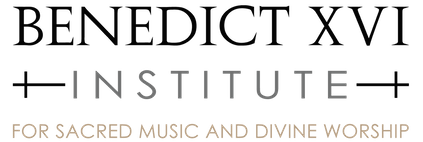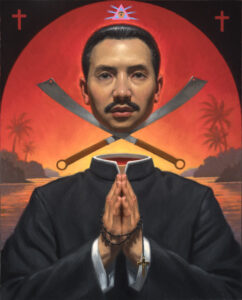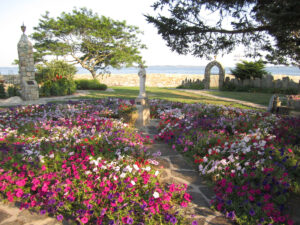Xanthe Kraft is a 28-year-old composer of sacred music. Her Speravit Anima Mea, a setting of Psalm 129 for violin and two voices, premiered at the Benedict XVI Institute’s Sacred Music Concert at St. Patrick’s Seminary Chapel July 1, 2022.
Kraft, a native of Spokane, Washington, attended Dartmouth College, where she majored in computer science with a minor in philosophy. She has a master’s degree in digital music from Dartmouth and a master’s degree in education from Liberty University. In 2017 she was a composition fellow at the Nadia Boulanger Institute in Paris, and in 2019 she was artist-in-residence at St. Gertrude’s Monastery in Cottonwood, Idaho, where she composed a Mass of the Annunciation for congregational singing. She currently teaches science, mathematics, and music to grades 6-8 at St. Charles Classical Catholic School in Spokane.
Her music, typically composed for solo performers (including her sister Yvette, an accomplished violinist) and small ensembles, has a spare, haunting quality that reflects her fascination with the rugged terrain of the Northwest where she grew up. A panoramic photo of the Canadian Rockies in winter, taken by Kraft herself, dominates the site.
Xanthe Kraft, “Speravit Anima Mea” as performed by the Sacred Music Project Choir at the July 1 concert sponsored by Benedict XVI Institute may be seen and heard here: https://youtu.be/X8VCAAcnIog
Catholic Arts Today editor Charlotte Allen recently talked to Kraft about her music and her faith.
Charlotte Allen: There’s a certain affinity between the stark landscape of the fir trees in the snow in the mountains in the photo on your website and your music, which has a very austere aspect to it. Do you draw on your local landscape in making your music?
Xanthe Kraft: Absolutely. I was born and raised in Spokane and regularly went up to the Selkirk Mountains in northern Idaho, and Canada about once a year. I’ve been formed by the landscape and formed by the culture that was formed by the landscape. Here the culture is very different than that of the coastal areas: more rugged and spacious. When I was at school in New England, for example, I had a hard time just expressing to people who lived there just how far apart everything is in the West. When I studied at the University of Edinburgh in, I mentioned that the distance between my home in Spokane and Seattle, which is the most populous city in Washington, is half the distance from Inverness to London. That has formed the spacious, simple, and contour-driven nature of my music.
The way that mountains naturally are is similar to the way the cracks in a rock might form, or the waves of a lake. The mountains look like a wave on a lake that looks like a ridge on a rock and even looks like a branch on a tree. All of these–the similar contour, the similar threshold–I definitely have in my music, and I find it in Gregorian chant. It’s all very connected.
Charlotte Allen: Is there a little Celtic music there, too?
Xanthe Kraft: I grew up in that musical tradition on my mom’s side: Scotland, Ireland, France, even the Celtic regions of France and England. I grew up listening to Celtic music. My mom would play the piano–she was taught by ear to play the piano–and she’s always had a contemplative melodic style of her own. It was less like the upbeat dance music at a céilí and more the music that has its origins in the Celtic monasticism of the 400s and 500s. That was an aspect of Gregorian chant that infused the popular culture that produced many of the popular Catholic hymns that pop up in the Mass. I’ve been surrounded by that music, both from my identity as a Catholic, singing the Catholic hymns, but also in my family identity and then later in my study of Gregorian chant.
Charlotte Allen: What led you to major in computer science at Dartmouth?
Xanthe Kraft: I didn’t pursue music very seriously early on in my life. I didn’t take the study of music as seriously as my younger sister, for example. I wanted to be an astrophysicist because I love the beauty of science and the rigor of science. I got encouragement to study science, and I was very motivated by the encouragement.
When I got to college, I loved computer science because it was a great synthesis between philosophy and science–because coding is thinking, and it’s powerful thinking that has very practical uses, but it’s also very high-level and abstract. Back to the landscape example: In the mountains you have the austere threshold of the mountains that intersect with the softer threshold of the hills, which intersect with maybe an even softer lake or a road. I was always interested in the intersection of things. And that’s what I liked about computer science. I saw it as a really nice synthesis of all the things I love. I love the artistic applications of code. It involves a lot of animation and music, and it’s also rooted in words, in logic. I also just frankly enjoy the collaborative nature of it.
I was always pursuing music on the side. In my high school years I composed solo piano pieces which merged landscapes and stories. Early on I adapted my compositions for my a cappella group to sing. This group, called “X.ado” which means “to sing for Christ” sang a variety of music from Christian to pop. It was through my involvement as music director of X.ado that I saw that I loved music more than just something on the side. And I also love to teach. I thought I could continue to have this love of philosophy and this love of science and this love of the humanities. I thought of it as a way that I could make music composition a bigger priority.
Charlotte Allen: Lately your music seems to have been composed for instruments, for violins in particular, and also the human voice. How did you come to start writing for instruments?
Xanthe Kraft: I’ve always been involved in liturgical music, in chanting the songs and also helping to select and perform pieces of work for the liturgy. String-writing can be very forgiving in a way that writing for other instruments like brass or woodwinds isn’t. Strings are close to the human voice. I loved the way that strings could elongate notes similarly to the voice in ways that the piano can’t. Being able to construct something that has multiple layers of harmony and melody, and that can stretch them out or elongate the note like the voice, but without needing words, was very appealing. It was the perfect way to explore music disconnected from any words but that still had the beauty of the voice.
Charlotte Allen: Going to your faith, you’re obviously filled with a desire to serve God, to serve Christ through your music. Is that something that you have felt all your life?
Xanthe Kraft: I have always thought religiously in terms of music. Even early on, when I wasn’t as well formed in the faith, I recognized the deep connection between music and spirituality even though I didn’t experience it within my own faith tradition at the time.
Quite frankly, as a teenager I perceived that the Catholic Church was stupid and ugly because religion was the easiest class in my Catholic school and religious music in church was the ugliest music–but that there was this other spirituality. I didn’t think of it as a different faith. I thought of it as an expression of the faith that I was definitely not finding in church. And then, when I wrote music for my a cappella group, I wrote songs that we performed, and I witnessed the way that this music had an effect on the people for whom we sang, regardless of the text. When we performed in South Korea, there were some folks who did not speak English, and when they heard one of my songs, they were able to tell me exactly the meaning of it through a translator, without knowing the words.
And this really intrigued me. It was at this time that I really started to dive deeper into my faith. This would be Gregorian chant and even classical music from a Catholic perspective, seeing how Catholic classical music really is. That’s when I began to actually arrange and compose specifically for the liturgy. I didn’t plan to be a liturgical composer, but I had the very practical constraints that a lot of the beautiful music that I loved was written for a full choir, and all I had was just myself and a few amateur singers. So I would modify and then even write my own things that I knew were simple but still profound, based on the sonic structure of the universe and patterns that are ever ancient, but ever new and that could be sung by an amateur ensemble. I see a need and I fill it.
Charlotte Allen: When you were the composer-in-residence at St. Gertrude’s, you composed a Mass to be sung by people who were obviously not trained singers. How you compose for musicians who aren’t trained and who are encountering your music for the first time and maybe the last time?
Xanthe Kraft: I almost never write for trained musicians. Because I’ve always been outside of the professional music world, except for the two years that I was a master’s student at Dartmouth and when I wrote a violin piece for my younger sister, I’m always writing for amateurs. I say that word with love. They are not professionals, but they have a love of music. I would just write the most beautiful things that could be sung by people that I know and I sing with. And that’s very easy to do. There’s a reason why the Celtic hymns have endured for so long. They have gorgeous melodic contours that are, I think, deeply rooted in nature and in spirituality. And people remember them and can sing them with ease and with joy. I was really trying to capture that in my Mass of the Annunciation.
Charlotte Allen: But the singers who, for example, sang your Anima Mea Speravit at the Benedict XVI Institute’s Sacred Music Concert this summer were trained.
Xanthe Kraft: Those who sang it were well-trained and beautiful professionals, and I was blown away by the quality of that performance as a whole. But that piece is not very complicated. It’s not something that requires a lot of musical ability to do and already has been performed by semi-professional people who have studied music. They may be a stay-at-home mom, or they live far away, in a parish setting. It’s something that is at a higher level than people who don’t have singing experience, but I wrote it for any parish that can hire a cantor or two.
I made it very adaptable to instruments, or even to be sung a cappella for people who don’t have an organ. The minimum requirement is one instrument. You can play it on the organ or a keyboard, or you can sing it with two people, or you can have an organ and sing it with two people, and even better if you happen to have a violinist or a flautist. You can have all four, but the way that I wrote the violin line, it can be condensed into the organ if need be, or condensed by one of the singers if need be. So even though it’s beautiful done by people of such high quality, it really could be done without that skill level.
I firmly believe that people do not need to be professionally trained to produce vast sonic beauty. And by the word vast, I mean, deep sonic beauty. Take, for example, Psalm tone II, it’s very simple. It’s used for Psalm 51, which is chanted in the Liturgy of the Hours by lay people and religious all around the world every Friday. Just that simple line chanted to Tone II—there’s no harmony or anything else–is so profoundly beautiful. And for the sake of everyone’s spirituality, for the sake of belief in the Real Presence in the Eucharist, we need extremely beautiful music that’s not lacking in depth or beauty. I make it accessible to the middle schoolers I teach because they’re the ones I have to work with. And they’re the ones who especially desire it. And they love it, and they love to take it and sing it. And I’ve seen students get invigorated by being able to chant music that they perceive as really spiritually profound, but that they can master and do well.
Now, if the whole world of parishes could have professional music directors and professional choirs, I would want that. But the liturgy is the same liturgy wherever you are. Jesus is fully present, whether at a rural parish or the Cathedral of Our Lady of Lourdes in Spokane.
Teach the children that this is their tradition and this is their heritage, and that they can be formed by good music, even if their school does not have the resources to have professional quality all the time—that is what I believe can be done.
Xanthe Kraft’s website is: https://axgkraft.wixsite.com/xanthekraft




